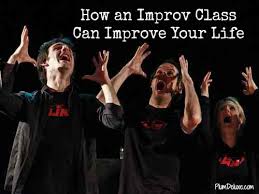Positive Effects of Improvisation
By John Cane
Improvisation exercises afford a safe, creative environment for individuals to go through first-hand self-guided learning. Through the interactive exercises and activities, a person is able to experience learning on an intellectual, physical and emotional level. When individuals do improvisation they fall into the moment of expression and creation, forgetting to judge and be self-critical and instead follow the impulse of instantly responding to what is in the moment, whether it comes in the form of another person or other people or in music.
The first rule in improvisation is to always say, “Yes, and…”, which means allowing oneself to work with any idea or feeling given by others or by circumstances before making a judgment and denying it, which has been used in brainstorming within organizations.
The process and activity of improvisation is about being optimistic, having fun, and trying things out which makes improvisation an essentially positive, encouraging, and constructive activity. Humor is often a result of exercises and activities in the workshops, which can contribute to a healthy state of well-being. Doing improvisation exercises often extends into usable life skills. The more a person learns to respond positively when doing the exercises, the more his or her coping skills improve as does the ability to face daily challenges.
An indispensable aspect of improvisation is realizing and applying the ability to stay in the moment, which can be of benefit to individuals when dealing with stress. Part of the importance in doing improvisation lies in the opportunity for an individual to exercise the ability to shut down the inner critical voice. This inner voice can get in the way of one’s true self and creative potential. Without the critical voice, and being in the moment, people can become present in the experience of the ‘now’ with no emotional obstacles or expectations such as worrying about what other people think or about future and past concerns.
Improvisation workshops allow an individual to experience self-growth. Because the exercises and activities are interactive, people can experience growth on both emotional and physical levels. This personal growth offers individuals the opportunity to transfer this knowledge to other areas of their lives.
About the Author
For over 15 years, John Cane has helped over 100,000 individuals in areas of Self Improvement. John is a Life Coach, motivational speaker and writer who develops and implements confidence and self-esteem workshops in Baltimore, Florida, Georgia, Illinois, New York, North Carolina, South Carolina, and Virginia. With a background in Psychology, he has six certifications in Personal Growth and Development. His Journal Books, ‘Important Things I Remember from My Parents’ are used in schools and as an aid for adults in gaining strength in self identity in the United States and Europe.
John Cane is the founder of Edge Advantage, Inc. Edge Advantage (www.seetheobvious.com) is a personal development organization dedicated to research-based, practical psychology training. Our focus is on communication, individual performance, and reducing stress. The objective of John’s websites is to bring the most current developments from these areas to those who use them everyday, educating in a form that is clear and practical. John is the webmaster of Self Help Guides Online (.com) and See the Obvious (.com). He is currently pursuing his Doctoral Degree in Psychology at Saybrook University, Oakland, California. His specialization, Psychology of Creativity Studies focuses on finding ways for individuals to experience their limitless potential and realize personal success and fulfillment in life.








